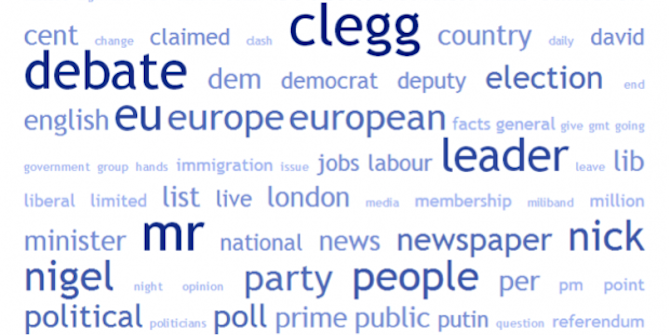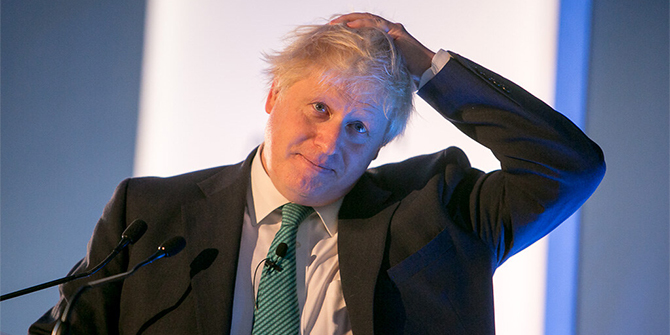 In the wake of the two Clegg vs. Farage debates, most have agreed that Farage came out on top. Nick Anstead finds that there were in fact different discussions going on as the two party leaders talked across each other. He writes that Clegg seems to have lost the debates because he was perceived to be the representative of the political class against Farage’s plucky everyman. Breaking this dynamic is the real challenge for mainstream politicians.
In the wake of the two Clegg vs. Farage debates, most have agreed that Farage came out on top. Nick Anstead finds that there were in fact different discussions going on as the two party leaders talked across each other. He writes that Clegg seems to have lost the debates because he was perceived to be the representative of the political class against Farage’s plucky everyman. Breaking this dynamic is the real challenge for mainstream politicians.
A couple of weeks ago, I blogged on the Insight blog about the incentives for both the Liberal Democrats and the United Kingdom Independence Party to take part in the two-way Nick Clegg vs. Nigel Farage debates. Broadly, the argument was that – as the two parties were not really competing for the same base of voters – the debate would ultimately serve the interests of both parties.
It is too early to say yet whether that prediction is true. Post-broadcast polls following both debates suggested that, in the eyes of the audience at least, Farage had won a comfortable victory over Clegg (see here for public reaction to the first debate, and here for reaction to the second debate). Broadly, we should not be surprised that Clegg came off worse in these snap polls. As he himself knows from his 2010 debate experience, novelty is a powerful weapon, at least in the short term.
However, despite the heavy coverage they received in the immediate aftermath, the televised debates still seem to have had little impact on the polls. Most surveys conducted after debate, whether asking about potential general election voting intention or European parliament preferences, showed no real discernible change in the support level for the two parties (the one exception being a Sunday Times / YouGov poll which had the Liberal Democrats down two points, and UKIP up by five).
However, and as importantly for how politics is going to play out in the future, the debates did make very evident some of the rhetorical dividing lines that currently exist in British politics. In order to better understand this, I conducted a very quick study of post-debate media coverage.* Broadly, the sample I worked with was newspaper coverage of the debate published between 27th March 2014 (the day after the first debate) and 4th April 2014 (two days after the second debate). You can find the results of this search in this document. In total, it includes approximately 480 articles, containing some 178,000 words.
A very simple way of visualising this is a tag cloud. With this method, the size of the word equates with how frequently it occurs in the text. A tag cloud of all the newspaper articles text is shown below. This diagram tells us a few things about post-debate discussion. Certainly, questions of identity were heavily emphasised (English, Britain, British, Europe, European etc.). Additionally, what political scientists Frank Esser and Paul D’Angelo term “meta-coverage” seems to at the forefront of media reporting. This is when political reporters focus on who has won or lost, and the political strategies that have led to these outcomes (so in this tag cloud, words such as per cent and polls might represent meta-coverage. References to the other absent party leaders might also fit into this category). While they do feature, words like immigration and jobs are surprisingly small.
Figure 1: Tag cloud of 100 words most frequently used words in post-debate newspaper coverage
However, it should be noted that, as a method to understand large bodies of text, tag clouds have a number of important limitations. The first issue is a simple presentational point. The size of words reflects not only the frequency of their use, but also the length of the word (so in the above example, the size of Debate and Mr reflects a similar number of uses, even though the former is far more prominent). Additionally, tag clouds only tell us how often words were used in a piece of text, but fail to tell us much about the relationships that exist between words.
In order to overcome this difficulty, I deployed a second method using the text analysis software package QDA Miner / Wordstat. First, I extracted every sentence in the dataset that referenced Farage or Clegg. I then had two datasets which I could compare. There are a number of things that can be done with this kind of data, but a simple and quick way of examining it is simply to look for the largest discrepancies between them i.e. words that appear a lot more in one dataset than the other. I did this for both politicians. The findings are presented in Table 1.
Table 1: Most distinctive words in Clegg and Farage focused sentences
| Distinctive words used in Farage sentences | Distinctive words used in Clegg sentences |
| PUTIN | DEBATE |
| ADMIRE | EU |
| LEAD | BRITAIN |
| PRESIDENT | EUROPE |
| VOTE | JOB |
| WHITE | UKIP |
| IMMIGRATION | MEMBERSHIP |
| POLICY | EUROPEAN |
| RUSSIAN | LIB |
| WORK | ACCUSE |
This offers us a few insights that are not available from the tag cloud. In particular, it suggests that there were two quite different debates going on, with Clegg and Farage talking across each other. Ironically, considering he was facing the leader of the United Kingdom Independence Party, it is Clegg who is most frequently referenced in conjunction with the EU, European, membership, and Britain. In other words, the Deputy Prime Minister’s performance in the debate does seem to have been reported through the prism of Europe. In contrast, there are two distinct strands to the coverage of Farage’s performance: first, a focus on his comments about Russia, the Ukraine and Vladimir Putin (Putin, admire, president and Russia); and second, more populist political issues (immigration, white and working).
This divergence is interesting. Recent research, notably Robert Ford and Matthew Goodwin’s Revolt on the Right, argues that the success of UKIP has very little to do with popular feeling about the European Union, and much more to do with economic insecurity and a broader alienation from the political class. Therefore to make UKIP all about Europe – and also to try to argue against them on those terms – is never going to work. In this context even the attacks on Farage about his alleged support for Putin will likely have little impact, with voters interpreting them as being either highly abstract, or an attempt to smear the party by a combination of established politicians and the mainstream media.
It should be noted there are huge limitations to the “quick and dirty” method I have employed here. The dataset does not examine what the candidates actually said, but instead only media coverage of the debates. Sadly, there is not yet a full transcript of the debates available. Furthermore the analysis excludes social media commentary (although the think tank Demos had an excellent go at doing some of this kind of analysis on the debate night itself). The method I have used is also relatively crude, and could be improved by either more rigorous quantitative significance testing or more qualitative human engagement with the raw data.
Nonetheless, the results do point towards something interesting. Arguably the reason that Clegg lost both the debates was not because the British public disagree with him on Europe. In fact, polling evidence would suggest a majority of them more closely identify with his position than with UKIP’s (even if they do regard Europe as being a relatively insignificant issue). In fact, Clegg seems to have lost the debates because he was perceived to be the representative of the political class against Farage’s plucky everyman. Breaking this dynamic is the real challenge for mainstream politicians.
*So as not to disrupt the flow of this blog post, I have produced a separate and much more detailed methodological discussion of my analysis on my own blog here. You will also find a more complete explanation of the Clegg and Farage specific word lists and how they were generated in this post.
Note: This article gives the views of the author, and not the position of the British Politics and Policy blog, nor of the London School of Economics. Please read our comments policy before posting.
About the Author
 Nick Anstead is an Assistant Professor in the Department of Media and Communication at the LSE. His research focuses on the relationship between existing political institutions and new media, covering such topics as the impact of the Internet on politics and government (especially e-campaigning); the history and future development of political parties; and encouraging participation in civil society.
Nick Anstead is an Assistant Professor in the Department of Media and Communication at the LSE. His research focuses on the relationship between existing political institutions and new media, covering such topics as the impact of the Internet on politics and government (especially e-campaigning); the history and future development of political parties; and encouraging participation in civil society.









Well from what I saw Clegg was trying to shout over Farage who just stopped and waited until the rant ended then carried on with what he had been saying, Farage showed the expected respect allowing Clegg to make his point, to attempt to review this as a slanging match of the PMQ’s variety is rather puerile, and displays the authors bias. Farage no doubt boosted UKIP, whereas Clegg just banged the final nail in the coffin of the lib dems for the next decade at least, right after their best election results in decades he has completely blown it.